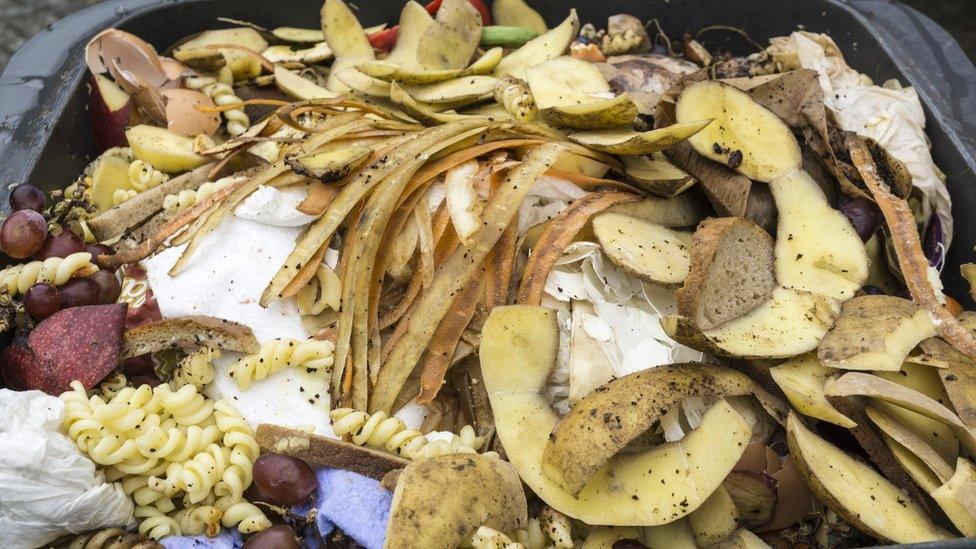Food Waste Action Week: People should throw less away
- Published
- comments

Recycling your food waste is a good way to reduce your impact on the environment
A new campaign hoping to 'wake the nation up' to the environmental consequences of wasting food starts on 1 March.
Organisers hope to shine a light on how wasted food affects everyone and how we can all take steps in our daily life to prevent food waste.
According to the UN if food waste were a country it would be the third highest emitter of greenhouse gasses after the US and China.
WRAP, the organisation behind the scheme, says reaching citizens of all ages with this message is essential for creating lasting change and reaching the UN Sustainable Development Goal of halving food waste around the world by 2030.
'Make wasting food a thing of the past'
Food takes months to grow before then being delivered to shops for us to buy and eat. This process uses a lot of water, energy and transport to get it to our plates. Processes that can contribute to climate change.
So, caring about what we then do with that food is vital to protecting not just our finances - how much we spend - but also the health of the planet.
Since 2005 organisers behind this new week of food waste action have been keen to emphasise the part we all have in contributing to food waste.
Data suggests that we are starting to make a difference, with the UK's annual food waste reducing from 11.2 million tonnes to 9.5 million tonnes but the charity says much more needs to be done.
The climate crisis remains one of the biggest and most urgent challenges facing humanity. Wasted food has a significant contribution to climate change, and is something we need to address together... to make wasting food a thing of the past.
Individual action
Making people aware of their impact on the environment is crucial to helping people learn what they can do to reduce harmful habits like throwing away food.
Rutland Youth Council has got several families involved in trying to cut food waste.
Ashley is 16 and said: "Everyone needs to get involved and everyone needs to realise that what they are doing with food waste is damaging the environment."
Heather is 17 and said: "The main thing people aren't relating food waste to is climate change because people are just thinking that if they're throwing food away then it is more a factor which is concerning them financially whereas it is all about the production process which that food has to go through in order to be on your plate."
Celebrity chef Nadiya Hussain has campaigned against food waste she said: "Your freezer is your pause button, if something is about to get close to its use by date, pop it into the freezer, whether it is cheese or milk, pop it into the freezer and you can basically just put pause on that use by date and then just use it as soon as it comes out of the freezer."
Why not help your parents plan meals for the week so they don't buy more food than you need.
Don't put more than you will eat on your plate. This avoids it ending up in the bin.
Eat up your leftovers the next day, you can make them into a different meal, for example extra potatoes can be fried the next day.
If any food is coming up to its use by date and you don't need it straight away put it in the freezer for another day.
Avoid having piles of fresh food which won't be eaten before it goes off.
Storing some fresh fruit like grapes in the fridge can make them stay fresh a bit longer.
Fast food restaurant waste fills bags on the streets of London.
Businesses getting involved
The idea is not just to concentrate on what families can do at home - but this year WRAP wants to focus on the food and hospitality sector too, which is responsible for around 1.1 million tonnes of food wasted.
Restaurants and the food service sector can end up throwing lots of food away. Much of that is food people order but then don't eat it.
So identifying how businesses can ensure as little food as possible is thrown away is really important.
Lots of big food companies have signed up to the initiative to help reduce waste.
Food Waste Action Week will run from 1 - 7 March 2021.
What are you doing do reduce your food waste? Let us know your tips and tricks for getting the most from your food and where your leftovers go.
- Published16 October 2014
- Published14 March 2019
- Published1 March 2021
